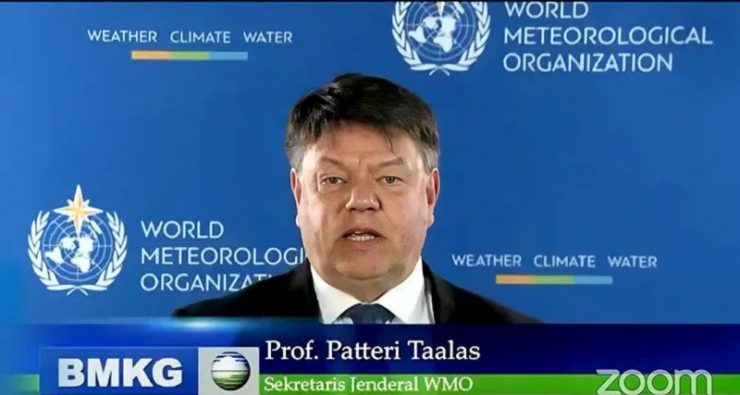SECRETARY General of the World Meteorological Organization (WMO), Prof. Petteri Taalas revealed that the impact of climate change is already very visible through more extreme weather in all parts of the world.
In this year’s world meteorological commemoration, WMO launched the theme “Early Warning and Early Action” which means early warning by acting earlier in mitigating disasters caused by weather, climate and water conditions that now tend to be extreme.
“We are seeing more intense heat waves and droughts and wildfires. We have more water vapor in the atmosphere, which causes extreme rainfall and deadly flooding. The oceans trigger stronger tropical storms and rising sea levels are increasing their impact,” he said in a statement. his remarks at the 72nd World Meteorological Day Peak event were followed online in Jakarta, Wednesday.
The WMO report on disaster statistics for the past 50 years shows that more than 11,000 disasters related to weather, climate, and water-related hazards between 1970 and 2019, almost equal one disaster per day.
There are 2 million deaths or 115 per day. The number of disasters has increased fivefold in the last 50 years, and the economic costs have soared. That is expected to continue, he said.
Similarly, the Head of the Meteorology, Climatology and Geophysics Agency (BMKG) Dwikorita Karnawati said that climate change is a reinforcing factor why extreme weather is becoming more frequent in Indonesia. Starting from heavy rains accompanied by lightning and thunder, tropical cyclones, high waves, to hail or long droughts.
This extreme situation, he said, when met with environmental vulnerability, often results in hydrometeorological disasters such as floods, flash floods, hurricanes, and landslides and land fires.
It is also climate change that is ravaging climate and weather regularities in Indonesia, and has a serious impact on the sustainability of the agriculture and fisheries sector, which can lead to threats to Indonesia’s food security.
Dwikorita said that in order to suppress the pace of climate change, collaborative and collective action is needed in Appropriate Planning in every Development Program, which is accompanied by the Preparation of Spatial Planning that is Environmentally Insight and Resistant to Climate Change and Disasters.
According to him, this strategy needs to be supported by efforts to Adapt and Innovation Technology based on Community Empowerment. The pentahelix collaboration, including through the Government, academics/scientists, the private sector, the public and the media, is the key to solutions in dealing with all these complexities and uncertainties.
“Furthermore, the Early Warning system also needs to be strengthened with educative guidelines to provide the community’s ability to respond with fast and appropriate early action,” he concluded. [antaranews]
















